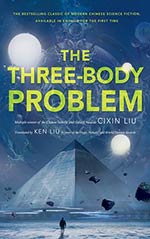
![]() nottheone
nottheone
7/22/2016
![]()
I was tempted to believe that a lot of the things Liu writes in this book, particularly the parts about the Cultural Revolution, came from personal experience, but in interviews, he cautions readers not to infer too much about his personal views from his novels. Instead, he want readers to focus on the universal truths within the narrative.
"I hope that one day, American readers will buy and read Chinese science fiction because it's sci-fi, not because it's Chinese," he says. "The calamities we face in science fiction are faced by humanity together."
I listened to this as an audio book, and I very much liked the voices Luke Daniels gave to the different characters, particularly the police detective, Shi Qiang. This character adds a lot of humor and is often a stand-in for the reader. Unlike many of the other main characters, he is not a scientist, so the scientist characters have to explain things to him--and to us, the readers--so that we understand the implications of the plot. Big Shi's philosophy, "Anything sufficiently weird must be fishy," helps ground the story in reality, a necessity when the ideas being bantered about include "unsolvable" physics problems, bizarre computer games, and multi-dimensional universes.
One large section of the book that really blew my mind was the description of how, within a computer game world, a character created a computer made up of (computer-generated) human beings. It is one of the most imaginative things I have ever read, I simply cannot do justice to describing this part of the book; you have to read it to experience it.
Having said that, other than the description of the human computer, I found most of the passages describing the computer game to be overly long and boring. That is my main complaint about the novel and the reason I am giving it four stars instead of 5.
I'm not sure how well some parts of the book would translate to the big (or little) screen, but the way the "good guys" find to destroy the headquarters of the "bad guys" is really incredible on both the visual and scientific levels. I won't say more in order not to spoil the surprise.
There's also some very excellent explanations of what it would be like to live in a universe that had more dimensions than our 3-dimensional world. I was glad that I had read "Flatland," it really helped me appreciate this section of the book. Like Abbot before him, Cixin does an incredible job using analogies to explain these complex physics concepts in a way that a non-scientist can grasp.
A little bit like Ender's Game, the big reveal of what is really going on takes place in the very last chapters of the book, and it's worth the wait. The last few sentences are incentive enough for me to want to read the second book in the trilogy.